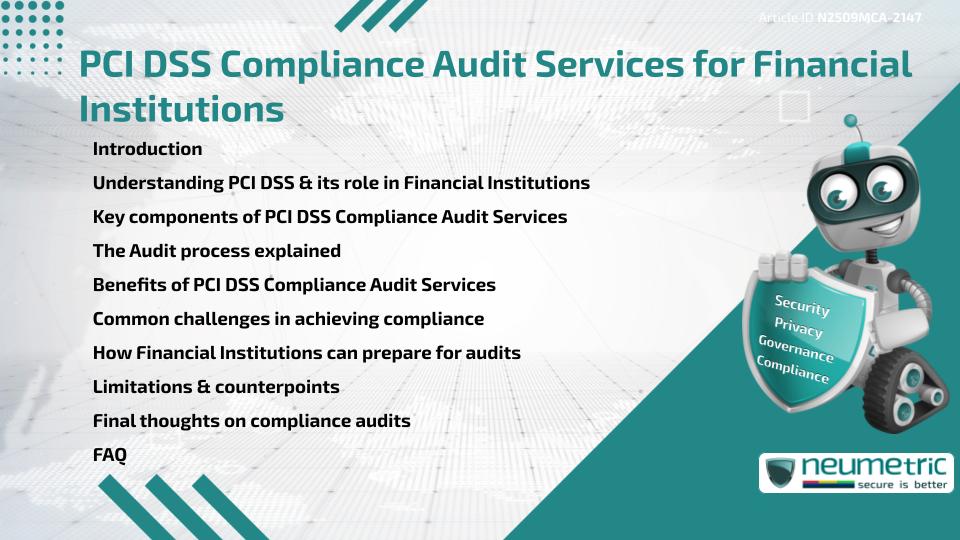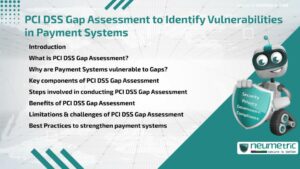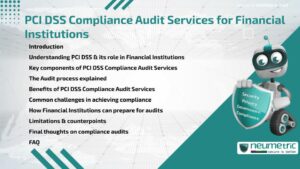Table of Contents
ToggleIntroduction
The Financial Industry is under constant pressure to safeguard Sensitive Payment Data. Payment Card Industry Data Security Standard [PCI DSS] Compliance Audit Services provide Financial Institutions with a structured way to evaluate & strengthen Data Protection. These Services verify whether Banks, Credit Unions & Payment Processors follow the Security requirements mandated for handling Cardholder Data. By undergoing an Audit, Institutions reduce Risks of data breaches, avoid hefty penalties & maintain Customer Trust. This article explains the meaning of PCI DSS Compliance Audit Services, their process, benefits, challenges & practical steps for Financial Institutions to prepare effectively.
Understanding PCI DSS & its role in Financial Institutions
PCI DSS is a set of Security Standards designed to ensure that all Entities involved in processing, storing or transmitting Cardholder Data maintain a Secure Environment. For Financial Institutions, adherence is not optional, it is a regulatory & reputational necessity. Non Compliance will lead to penalties, loss of processing capabilities & reputational damage. Institutions that comply demonstrate their commitment to Data Integrity & Customer Protection.
Please check the PCI Security Standards Council website for more details.
Key components of PCI DSS Compliance Audit Services
The Services are built around assessing an Institution’s alignment with the twelve (12) core PCI DSS requirements. These components often include:
- Network Security evaluation
- Data Encryption & Transmission checks
- Access Control verification
- Monitoring & logging practices
- Vulnerability Management Assessments
Together, these elements ensure that every stage of Cardholder Data handling meets PCI DSS obligations.
The Audit process explained
A typical PCI DSS Compliance Audit Services engagement involves several stages:
- Gap Audit – Reviewing current Security Controls against PCI DSS requirements.
- Remediation guidance – Identifying weaknesses & providing solutions.
- Onsite Assessment – Auditors Test Systems, Policies & Processes.
- Report on compliance – Documenting whether the institution meets PCI DSS Standards.
Each step is essential to building confidence that Cardholder Information remains secure throughout its lifecycle.
Benefits of PCI DSS Compliance Audit Services
Financial Institutions gain multiple advantages by engaging in these Services:
- Reduced Risk of Breaches & Fraud
- Avoidance of regulatory fines
- Improved Customer confidence
- Streamlined internal processes
- Strengthened reputation with Stakeholders
In simple terms, it is like performing a medical check-up. Detecting weaknesses early helps avoid bigger problems later.
Common challenges in achieving compliance
Despite the benefits, PCI DSS Compliance Audit Services are not free of hurdles. Common challenges include:
- Complex legacy systems that are hard to secure
- High implementation costs for smaller Institutions
- Limited in-house expertise to meet technical requirements
- Maintaining compliance over time, not just at Audit points
Compliance is an ongoing process & not a one-time process.
How Financial Institutions can prepare for audits
Preparation is critical. To succeed, Financial Institutions can:
- Conduct regular Internal Security Reviews
- Train Employees on PCI DSS requirements
- Document Policies & Processes clearly
- Invest in updated Security Tools
- Work with Qualified Security Assessors for expert guidance
Think of preparation like rehearsing before a performance-the more thorough the practice, the smoother the Audit outcome.
Limitations & counterpoints
While valuable, PCI DSS Compliance Audit Services have limitations. Passing an Audit does not guarantee absolute security. Threats evolve daily & attackers often exploit human errors or new Vulnerabilities. Additionally, Compliance will be resource-intensive, specifically for small Financial Institutions. It is important to balance compliance with broader Cybersecurity Strategies.
Final thoughts on compliance audits
For Financial Institutions, PCI DSS Compliance Audit Services serve as both a shield & a guide. They help Institutions meet Industry Standards, protect customers & uphold trust. Yet they are most effective when treated as part of a larger, ongoing security culture.
Takeaways
- PCI DSS Compliance is required for protecting Cardholder Data.
- Audit Services verify adherence to twelve (12) key requirements.
- Benefits include Risk reduction, Customer Trust & regulatory protection.
- Challenges such as costs & legacy systems must be managed.
- Preparation through reviews, training & expert help ensures better outcomes.
FAQ
What are PCI DSS Compliance Audit Services?
They are Professional Assessments that verify whether Financial Institutions follow PCI DSS security standards for protecting Cardholder Data.
Who needs to undergo PCI DSS Compliance Audit Services?
Any organisation that stores, processes or transmits Cardholder Data-including Banks, Credit Unions & Payment Processors requires these Services.
How often should Financial Institutions undergo Audits?
Annual Audits are generally required, but Institutions may need more frequent reviews depending on transaction volumes & Risk levels.
What happens if a Financial institution fails an Audit?
Failure will lead to fines, loss of card processing capabilities & reputational harm. Institutions must address gaps & undergo reassessment.
Are PCI DSS Compliance Audit Services mandatory for small Financial Institutions?
Yes. All Financial Institutions, regardless of size, must comply with PCI DSS if they handle Cardholder Data.
Do Audits guarantee Data Security?
No. They reduce Risks & strengthen controls but cannot guarantee absolute protection against all Cyber Threats.
How can Institutions prepare for Audits?
By maintaining updated security systems, training staff, documenting processes & working with Qualified Security Assessors.
References
Need help for Security, Privacy, Governance & VAPT?
Neumetric provides organisations the necessary help to achieve their Cybersecurity, Compliance, Governance, Privacy, Certifications & Pentesting needs.
Organisations & Businesses, specifically those which provide SaaS & AI Solutions in the Fintech, BFSI & other regulated sectors, usually need a Cybersecurity Partner for meeting & maintaining the ongoing Security & Privacy needs & requirements of their Enterprise Clients & Privacy conscious Customers.
SOC 2, ISO 27001, ISO 42001, NIST, HIPAA, HECVAT, EU GDPR are some of the Frameworks that are served by Fusion – a SaaS, multimodular, multitenant, centralised, automated, Cybersecurity & Compliance Management system.
Neumetric also provides Expert Services for technical security which covers VAPT for Web Applications, APIs, iOS & Android Mobile Apps, Security Testing for AWS & other Cloud Environments & Cloud Infrastructure & other similar scopes.
Reach out to us by Email or filling out the Contact Form…





